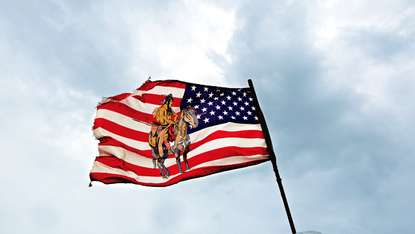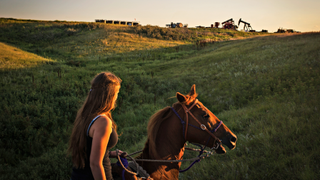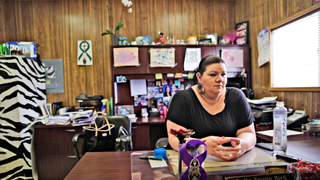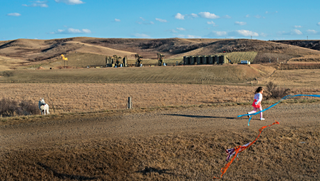


Six years ago, teenage girls on Fort Berthold, a Native American reservation in North Dakota, started showing up at school with unusual things: manicured nails, fancy makeup, iPods, brand-new cell phones. In a place where the poverty rate is often more than three times the national average and the unemployment rate hovers near 40 percent, no one could figure out how the girls were able to afford such luxuries.
Around the same time, the number of teenage runaways on the reservation, home to the Three Affiliated Tribes of the Mandan, Hidatsa, and Arikara nations (known collectively as MHA Nation), suddenly spiked. On one weekend alone, Angela Cummings, a former criminal investigator for the tribe, says she could expect to hear from three to 10 sets of parents: "There were a lot of parents searching for children who never came home." Before long, the girls began cycling through the juvenile justice system for minor offenses like underage drinking. Cummings compared notes with fellow MHA Nation members, and they noticed a trend: Many of the girls had matching tattoos, a red flag for involvement in prostitution, because pimps sometimes brand women that way. "Someone was actually marking these young 13-year-old girls," says Chalsey Snyder, a former tribal court clerk.

It was disturbing, but there were a lot of strange new things happening on the reservation. North Dakota was in the early days of a massive oil boom in its expansive Bakken shale formation, and tens of thousands of people from out of state were flocking to the area for high-paying oil industry jobs. From its position smack in the middle of the Bakken, Fort Berthold didn't want to be left out of the action, so MHA Nation leaders started leasing tribal lands held in a common trust to oil companies.
In no time, the number of oil wells on the million-acre reservation swelled to more than 1,000. The wells generate roughly one-third of the state's total oil output, earning the tribe more than $500 million between 2010 and 2012, accord- ing to a report by the nonprofit Property and Environment Research Center. Roughly two-thirds of that money went to tribe members who hold mineral rights to oil on land they owned on the reservation, the rest to the tribal government. While the system was designed to ensure that earnings would trickle down to adult MHA Nation members, most members, who do not hold mineral rights, have not benefited significantly. (Many members have criticized the tribal government for mismanaging the profits—for example, it purchased a $2.5 million, 149-passenger yacht called Island Girl.)
While the state as a whole was rocked by rapid social change during the boom, the upheaval felt especially chaotic on Fort Berthold. The insular community was swarmed by oil workers—almost all of them men, many young and unattached—who set up camp on their land, went out drinking in their bars, and spent large paychecks gambling at their casino, the 4 Bears Casino and Lodge in New Town, the reservation's largest city. "[It used to be] on every corner there would be someone you know," says Sadie Young Bird, who heads the Fort Berthold Coalition Against Violence. "Now, on the corner, it's a stranger."
[pullquote align='C']Earlier this year, North Dakota's legislature passed a suite of anti-trafficking laws to fund victims services, increase punishment for traffickers, and train police, but those laws don't cover Fort Berthold.[/pullquote]
Soon, it became clear the newcomers were creating demand for a whole new kind of problem. MHA Nation members began seeing women offering sexual services under the watchful eye of a pimp in local bars, gas stations, and the casino, which, as one of the only attractions of its kind for miles in any direction, is popular among oil workers. "It's happened right in front of me," Snyder says. "[Anyone] here can...tell you about the women and men, and some can speak of the children, they've heard of or seen engaged in the activity." Young Bird agrees. "The casino is where a lot of it happens. There are also little hotels...where things are happening. Some happens in the bars, of course," she says. "The influx of people from the outside came in, and they brought their technology here...and now they are setting up escort dates on those sites," she adds, referring to classified websites like Backpage.com, which traffickers often use to sell women and girls for sex.
Stay In The Know
Marie Claire email subscribers get intel on fashion and beauty trends, hot-off-the-press celebrity news, and more. Sign up here.
What they were seeing was so new that most tribe members didn't even know what to call it—they would have seen women being sold for sex at the casino as prostitutes, not trafficking victims. "The community was very naive to trafficking," Young Bird explains. "We didn't hear much about trafficking before the boom." But unlike many of their fellow MHA Nation members, Young Bird and Snyder believed women under pimp control are generally not there by choice, and according to the legal definition of the crime, anyone who is forced, coerced, or deceived into having commercial sex is being trafficked.
Officials across North Dakota were seeing similar evidence of trafficking, but whereas local leaders and citizens were tackling trafficking as a coalition, MHA Nation, which elects its own government and passes its own laws, was a lone wolf. Earlier this year, North Dakota's legislature passed a suite of anti-trafficking laws to fund victims services, increase punishment for traffickers, and train police, but those laws don't cover Fort Berthold.
With no anti-trafficking law of their own to deal with the crime and all signs pointing to a crisis, a group of tribal women snapped into action to work on a legislative solution. "No one said, 'Here is the course on dealing with trafficking, and this is how you're going to execute it,' " Young Bird says. "We've had to teach ourselves."
"We all came together," adds Cummings, "pulled what we could to the table, rolled up our sleeves, and got down and dirty with the whole situation."

Fort Berthold stretches across parts of six counties in the western half of North Dakota. The sparsely populated land, with its celery-green grasslands to the east and red-clay-soiled badlands to the west, has been home to MHA Nation since the three tribes came together in 1870 after each of their memberships was decimated by smallpox. Some 4,000 MHA Nation members now live in and around the six small towns that dot Fort Berthold, fewer than half of the 10,000 enrolled members of the tribe. (The rest, like the majority of the 5.2 million Native Americans nationwide, live off-reservation.)
Near the northwestern corner is New Town (pop. 2,401), the reservation's administrative center. It is, quite literally, a new town, formed in 1953 when the U.S. government built the Garrison Dam. The damming of the Missouri River created Lake Sakakawea, which forcibly dislocated tribal towns and sacred burial sites, pushing families to move their farms and the bones of their ancestors to the higher ground that now comprises New Town.
It was in New Town in the winter of 2009 to 2010 that investigators' phones started ringing with calls from parents worried about new friends their teenage daughters had made and parties they were attending at a house where a registered sex offender lived. Eventually, tribal law enforcement and the FBI, which shares jurisdiction with the tribe on major crimes, felt they had enough evidence to open a joint investigation with the U.S. attorney's office in North Dakota. According to court documents, they soon discovered Dustin Morsette, a then-20- year-old MHA Nation member, and a friend had recruited girls and boys—some as young as 12—into a criminal street gang they referred to as the "black disciples" or "devil's disciples." The plan was to manipulate the teens into selling drugs and engaging in sexual activity, including prostitution. Some members were branded with crosshairs or bull's-eye tattoos.
Morsette would invite teenagers to parties, then ply them with alcohol and drugs. One 15-year-old girl, who told investigators she was anally raped by Morsette, was asked if she would like to be the leader of the women in the gang. She said yes, and Morsette instructed her that she had to make him $200 a week. When she told him that was impossible, as she didn't have a job, he told her to "go sell herself." He then began setting up appointments for her with men who were to be charged $300 for sex. Another victim, an adult female, told investigators that on multiple occasions she had been sold for sex at the 4 Bears Casino. She testified that Morsette had raped her and coerced her into prostitution by threatening further physical abuse. He also threatened to send nude pictures of her to her family if she did not comply.

In August 2012, following a six-day jury trial, Morsette was sentenced by U.S. District Judge Daniel L. Hovland to 45 years in prison. It was the first time the federal government convicted anyone for sex trafficking on a reservation. "That case involved many, many agencies, and that is the thing we did best," says Paula Bosh, an FBI victim specialist. "We were a solid team."
Those who worked the case called it a wake-up call—or, in Bosh's words, "a punch in the face." It opened everyone's eyes to the need to get real about how the reservation was changing, and the growing market for trafficking. "That showed me no matter how close a community is," Cummings says, "anyone can fall prey to that." During the investigation, Cummings met regularly with Bosh and Loren Whitehorn, a behavioral health specialist for the tribe. When the case closed, the women kept meeting but shifted their focus to passing a tribal anti- trafficking law. They felt they'd been lucky to have assistance from the federal government in the Morsette case—otherwise, without their own law, they wouldn't have had much recourse.
Their concern was well-founded. The federal government often declines to prosecute crimes on Native American land. In 2011 alone, the Justice Department filed charges in only about half of murder cases and 35 percent of sexual assault cases on reservations nationwide. Most are turned down owing to a lack of evidence, which may stem from questions over who was tasked with investigating and prosecuting the case to begin with.
Which agency—federal, state, or tribal authorities—handles crimes on reservations is determined by who is involved. Offenses committed by Native Americans against Native Americans go to tribal police and courts, unless the crime is especially serious or violent (e.g., murder, rape, or sex trafficking), then the FBI and federal prosecutors can step in (whether they do is decided by the U.S. attorney). As for crimes committed by non-Native Americans on reservations? Those must be turned over to either the federal government or state authorities. (A 1978 U.S. Supreme Court ruling found that tribes have no jurisdiction over crimes committed by non-Native people.) So when tribe members call the police to report a rape or murder, officers must determine whose authority it falls under. On a reservation like Fort Berthold, flush with male workers from outside the tribe, it's no easy task. Tribal police must coordinate with sheriff 's departments in six different counties to deal with non-Native offenders. Not knowing the suspect's race altogether can cause detrimental delays for investigators. Such complications, tribe members say, make the reservation a "safe haven" for all kinds of criminals, including sex traffickers.
Researchers like Deer have found that because such trauma has occurred repeatedly through generations—"soul wounds," as scholars call it—Native American women are more vulnerable to trafficking.
The Tribal Counselor, Loren Whitehorn—who died in a car accident in 2013—was especially passionate about the need for legislation. She had counseled Morsette's victims and seen how easily the women and girls had been manipulated. "Loren was like, 'I'm heartbroken by all of this; we need to do something,'" Cummings says. Whitehorn had tapped her close friend Snyder, the former court clerk, to draft the legislative proposal. "I was so fucking proud to call myself Loren's friend and to be able to be part of this," Snyder says.
On a warm day in early June, Snyder is sitting in her living room with her friend Patty Stonefish, a martial arts instructor of mixed-Lakota heritage, discussing plans for a series of self- defense classes to be held on Fort Berthold through Stonefish's organization, Arming Sisters. "I haven't met a single Native American woman who hasn't been [sexually] assaulted," Stonefish says. "I haven't either," says Snyder.
Native American women are more than twice as likely to suffer sexual assault than any other women in the country. The Department of Justice reports that one in three Native American women will be sexually assaulted during their lifetimes—overwhelmingly by non-Native American men—compared with one in six American women overall. That estimate is likely low, because it relies on women self-reporting to federal employees over the phone. "When you ask Native women who work in the community and know what is going on...they laugh and say it is much higher than that," says Sarah Deer, a professor at Minnesota's William Mitchell College of Law, who researches violence against Native American women.
Researchers like Deer have found that because such trauma has occurred repeatedly through generations—"soul wounds," as scholars call it—Native American women are more vulnerable to trafficking. A 2014 report by the International Human Rights Clinic at Willamette University in Oregon found that generational trauma was the single-most-influential factor in Native American women's susceptibility to trafficking. The most destructive culprit was the boarding school system instituted in 1869 by the U.S. government, which removed thousands of Native American children of all ages from their homes and placed them into boarding schools. (The Bureau of Indian Affairs ran 25 of the schools, while federally funded churches ran another 460.) For Young Bird, the linger- ing connection between the boarding schools and trafficking is clear: "They were stolen against their will," she says. "Our people have always been hurt and controlled. This modern- day trafficking is a lot different, but it still goes back to the same things." Deer says history has taught many Native American women that if something bad happens, the system will not help them. "You don't trust a system that has never worked for your ancestors or your grandmother or your mother," she says.

Rather than continue to accept the system as is, Fort Berthold's women decided to change it. In October 2013, just a few months after Whitehorn died in the car accident (Snyder has the date, May 26, 2013, tattooed on her arm), Snyder received permission from the tribal government to put the draft of the law she'd been working on with Whitehorn to a vote in the Business Council, the tribe's legislative body. Among other things, the code defines human trafficking as a tribal crime, identifies underage kids sold for sex as victims rather than criminals, and, importantly, outlines culturally specific penalties like the loss of hunting and fishing rights and even banishment from the reservation—extreme punishments for MHA Nation members. The law could even award traffickers' oil earnings to victims, who would also be entitled to funding for counseling and medical treatment. It was a bold, empowering package shaped by Whitehorn's vision—no other tribe in the country had anything of its scope.
In December 2014, the tribe passed "Loren's Law," making Fort Berthold the first reservation in the nation to pass comprehensive anti-trafficking legislation. "I am impressed that a tribal government is passing a law like this," Deer says. "Even more so because it was championed by a grassroots group of Native women coming together."
This article appears in the October issue of Marie Claire, on newsstands now, and is a part of a larger series on sex trafficking—see it here.
Kayla Webley Adler is the Deputy Editor of ELLE magazine. She edits cover stories, profiles, and narrative features on politics, culture, crime, and social trends. Previously, she worked as the Features Director at Marie Claire magazine and as a Staff Writer at TIME magazine.
-
 Does Katie Holmes Have a New Favorite Shoe Trend?
Does Katie Holmes Have a New Favorite Shoe Trend?She swapped her usual sneakers for $150 Mary Janes.
By Halie LeSavage Published
-
 Nicola Peltz Beckham Skipped Her Mother-in-Law Victoria Beckham’s 50th Birthday Party—But There’s a Reason
Nicola Peltz Beckham Skipped Her Mother-in-Law Victoria Beckham’s 50th Birthday Party—But There’s a ReasonThe nonexistent Nicola/Victoria feud continues to not exist.
By Rachel Burchfield Published
-
 Hugh Grant Is More Than Ready for the Next 'Bridget Jones' Movie
Hugh Grant Is More Than Ready for the Next 'Bridget Jones' MovieThe fourth movie might just be the best of the entire series.
By Meghan De Maria Published
-
 'Ginny & Georgia' Season 2: Everything We Know
'Ginny & Georgia' Season 2: Everything We KnowNetflix owes us answers after that ending.
By Zoe Guy Last updated
-
 'Firefly Lane' Season 2: Everything We Know
'Firefly Lane' Season 2: Everything We KnowIn the immortal words of Tully Hart, "Firefly Lane girls forever!"
By Andrea Park Published
-
 31 Different Pride Flags and What Each Stands For
31 Different Pride Flags and What Each Stands ForInclusivity matters.
By Katherine J. Igoe Published
-
 'Bridgerton' Season 2: Everything We Know
'Bridgerton' Season 2: Everything We KnowThe viscount and his new love interest hit Netflix at the end of March.
By Andrea Park Published
-
 'Bachelor In Paradise' 2021: Everything We Know
'Bachelor In Paradise' 2021: Everything We KnowIt's back, baby!
By Andrea Park Published
-
 'Spencer,' the Princess Diana Movie: Everything We Know
'Spencer,' the Princess Diana Movie: Everything We Know"Every fairy tale ends."
By Andrea Park Published
-
 Who is Abigail Heringer From 'The Bachelor' and 'Bachelor in Paradise'?
Who is Abigail Heringer From 'The Bachelor' and 'Bachelor in Paradise'?The 25-year-old, who first appeared on Matt James' season, is a financial analyst with an inspiring backstory.
By Andrea Park Published
-
 What Does "ROC" Mean at the Tokyo Olympics?
What Does "ROC" Mean at the Tokyo Olympics?It's a temporary workaround in the aftermath of Russia's massive doping scandal.
By Katherine J. Igoe Published